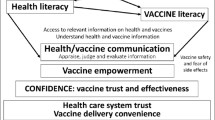Abstract
Albeit the vaccination is one of the most successful and cost-effective public health interventions, reluctance or refusal to vaccinate represents one of the ten threats to global health by the World Health Organization. Additional efforts to promote vaccination are required for at higher risk categories, such as pregnant women. Our approach supports the role of a clear and transparent communication by using efficient interventions and educational strategies to increase both willingness and confidence for preventable diseases in neonates and infants by vaccinations in pregnancy.

Similar content being viewed by others
Data availability
Data are available upon motivated request.
References
Scendoni R, Fedeli P, Cingolani M (2023) The state of play on COVID-19 vaccination in pregnant and breastfeeding women: recommendations, legal protection, ethical issues and controversies in Italy. Healthcare (Basel) 11(3):328. https://doi.org/10.3390/healthcare11030328
De Brabandere L, Hendrickx G, Poels K, Daelemans W, Van Damme P, Maertens K (2023) Influence of the COVID-19 pandemic and social media on the behaviour of pregnant and lactating women towards vaccination: a scoping review. BMJ Open 13(2):e066367. https://doi.org/10.1136/bmjopen-2022-066367
Gorgui J, Atallah A, Boucoiran I, Gomez YH, Bérard A, the CONCEPTION Study Group (2022) SARS-CoV-2 vaccine uptake and reasons for hesitancy among Canadian pregnant people: a prospective cohort study. CMAJ Open 10(4):E1034–E1043. https://doi.org/10.9778/cmajo.20210273
Sarantaki A, Kalogeropoulou VE, Taskou C, Nanou C, Lykeridou A (2022) COVID-19 vaccination and related determinants of hesitancy among pregnant women: a systematic review and meta-analysis. Vaccines (Basel) 10(12):2055. https://doi.org/10.3390/vaccines10122055
Marín-Cos A, Marbán-Castro E, Nedic I, Ferrari M, Crespo-Mirasol E, Ventura LF, Zamora BN, Fumadó V, Menéndez C, Martínez Bueno C, Llupià A, López M, Goncé A, Bardají A (2022) “Maternal vaccination greatly depends on your trust in the healthcare system”: a qualitative study on the acceptability of maternal vaccines among pregnant women and healthcare workers in Barcelona, Spain. Vaccines (Basel) 10(12):2015. https://doi.org/10.3390/vaccines10122015
Spielberger CD (1989) State-trait anxiety inventory: bibliography, 2nd edn. Consulting Psychologists Press, Palo Alto, CA
Triunfo S, Marconi AM (2023) Promoting the use of modern communication tools to increase vaccine uptake in pregnancy. JAMA Pediatr. https://doi.org/10.1001/jamapediatrics.2023.1807
Schaal NK et al (2022) Pregnant and breastfeeding women’s attitudes and fears regarding the COVID-19 vaccination. Arch Gynecol Obstet 306(2):365–372
Villar J, INTERCOVID-2022 International Consortium et al (2023) Pregnancy outcomes and vaccine effectiveness during the period of omicron as the variant of concern, INTERCOVID-2022: a multinational, observational study. Lancet 401(10375):447–457. https://doi.org/10.1016/S0140-6736(22)02467-9. (PMID: 36669520; PMCID: PMC9910845)
Rottenstreich M et al (2022) COVID 19 third vaccination during pregnancy: maternal and neonatal outcomes—a retrospective study. Arch Gynecol Obstet. https://doi.org/10.1007/s00404-022-06786-9
Acknowledgements
The authors acknowledge Ospedale Militare in Milan, Italy, for the support at the vaccination center.
Funding
None.
Author information
Authors and Affiliations
Contributions
ST: project development, data collection, data analysis, writing; VI: data collection; MP: data collection; DP: project development, data collection; SG: data collection; AMM: project development.
Corresponding author
Ethics declarations
Conflict of interest
None reported.
Additional information
Publisher's Note
Springer Nature remains neutral with regard to jurisdictional claims in published maps and institutional affiliations.
Rights and permissions
Springer Nature or its licensor (e.g. a society or other partner) holds exclusive rights to this article under a publishing agreement with the author(s) or other rightsholder(s); author self-archiving of the accepted manuscript version of this article is solely governed by the terms of such publishing agreement and applicable law.
About this article
Cite this article
Triunfo, S., Iannuzzi, V., Podda, M. et al. Reducing vaccine hesitancy in pregnancy by the health literacy model inclusive of modern communication tools. Arch Gynecol Obstet 308, 1391–1393 (2023). https://doi.org/10.1007/s00404-023-07138-x
Received:
Accepted:
Published:
Issue Date:
DOI: https://doi.org/10.1007/s00404-023-07138-x



